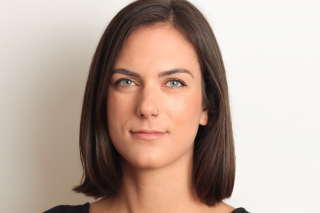Gwen Child is a substance use and mental health counselor at the Rosebud Sioux Tribe Social Detoxification Center, a new 15-bed facility located on the Rosebud Indian Reservation in Rosebud, South Dakota. As the center opens its doors, Gwen has played a pivotal role in developing its therapeutic model and training staff. She conducts inpatient and outpatient therapy as a member of a multidisciplinary team that includes a doctor, nurse, licensed substance use counselor, and medical technicians. In addition, she oversees intake and discharge assessments and manages a grant for suicide prevention programming, including a hotline. Working both in person and via telehealth, Gwen collaborates closely with the Rosebud Sioux Tribe to ensure culturally responsive care. “We’re looking at the gaps in service—meeting the reservation’s needs as determined not by us but by the community,” she says. “We’re supporting rather than directing.”
On choosing Simmons
Gwen graduated with a degree in Community Development and Applied Economics from the University of Vermont in 2016. While employed as a health coach, she witnessed the importance of mental health as “the basis for wellbeing.” Social work, she believed, would meld her passion for community development, mental health, and social justice, as well as offer long-term career versatility. In addition to Simmons’s reputation for outstanding clinical preparation, Gwen appreciated its internship opportunities and faculty known for their work in social justice and community engagement. “Everything fell into place at Simmons,” she says.
How Simmons prepared her
Gwen enrolled in the Certificate in Trauma Practice program, which, she says, built her understanding of intergenerational and other types of trauma. Coursework in substance use also proved instrumental for her current role, as did her Practice and Research courses. She praises the small class size and the quality of discussions. “I learned so much from the knowledge and experience of my peers,” she reports. Gwen completed two highly relevant field placements. At the Cambridge Eating Disorder Center, she facilitated groups and counseled individuals in the Intensive Outpatient Program. An internship at Cambridge Health Alliance (CHA) allowed her to expand her skills to an integrated primary-care setting where she provided short-term counseling to a range of patients. All together, she says, the strengths-based approach at Simmons Social Work “opened up my worldview in critical ways.” She explains: “The school's clinical lens taught me to meet a person where they are at without judgment—to understand how one's identity and environment shape their experiences and perspective."
Why the work is meaningful
“I enjoy helping people see they have the tools to accomplish what they want,” says Gwen. “I’m interested in working with Indigenous populations for many reasons, but one of them is the historical value in holistic being. This connection between mind, body, and spirit can potentially be a massive strength and protective factor on the journey to becoming sober.”

